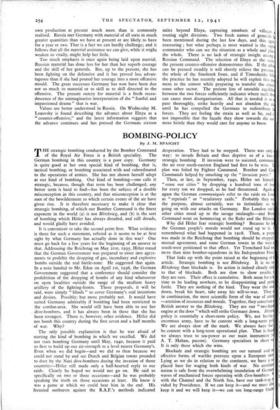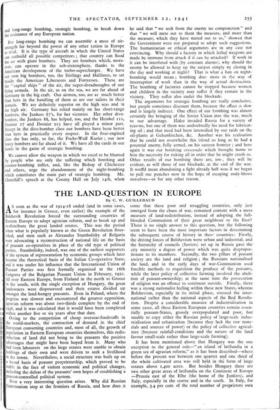BOMBING-POLICY
By J. M. SPAIGHT It is convenient to take the second point first. What evidence is there for such a statement, refuted as it seems to be at first sight by what Germany has actually done in this war? One must go back for a few years for the beginning of an answer to that. Addressing the Reichstag on May 21st, 1935, Hitler stated that the German Government was prepared to enter into agree- ments to prohibit the dropping of gas, incendiary and explosive bombs outside the real battle-zone. He suggested that again. In a note handed to Mr. Eden on April 1st, 1936, the German Government suggested that a conference should consider the prohibition of the dropping of bombs of any kind whatsoever on open localities outside the range of the medium heavy artillery of the fighting-fronts. These proposals, it will be said, were simply " blinds " to cover Germany's real intentions and desires. Possibly; but more probably not. It would have suited Germany admirably if bombing had been restricted to the combat-area. She would still have been able to use her dive-bombers, and it has always been in these that she has been strongest. There is, however, other evidence. Hitler did not bomb this country during the first seven and a half months of war. Why?
The only possible explanation is that he was afraid of starting the kind of bombing in which we excelled. We did not start bombing Germany- until May, 1940, because it paid us first to build up our air-strength to a level nearer Germany's. Even when we did begin—and we did so then because we could not stand by and see Dutch and Belgian towns pounded to dust by the Nazi dive-bombers during the invasion of those countries—Hitler still made only a half-hearted reply to our raids. Clearly he hoped we would not go on. He said so specifically on two or three occasions—and he was probably speaking the truth on those occasions at least. He knew it was a game at which we could beat him in the end. His frenzied outbursts against the R.A.F.'s methods indicated desperation. They had to be stopped. There was only way: to invade Britain and thus deprive us of a base strategic bombing If invasion were to suCceed, command the air over south-eastern England had first to be won. plan was foiled by Fighter Command. Bomber and Commands helped by smashing up the "invasion ports."
Then, at last, in September, 1940, Hitler set himself "erase our cities" by dropping a hundred tons of be for every ton we dropped, as he had threatened. Again again the German communiqués refer to the raids on Lon as " reprisals " or "retaliatory raids." Probably they the purpose, almost certainly, was to intimidate us ft going on with our attacks on Germany. But London and other cities stood up to the savage onslaught—and Bo Command went on hammering at the Ruhr and the Rhine!
Why did Hitler fear strategic bombing? Because he the German people's morale would not stand up to it. remembered -what had happened in 1918. Then, a pror was made in the Reichstag that bombing should be stopped mutual agreement, and some German towns in the west south-west petitioned to that effect. Yet Trenchard had n more than nine bomber-squadrons in his Independent Force That links up with the point raised at the beginning of article. Strategic bombing is not Blitzkrieg. It is no Blitzkrieg than blockade is. Its action is indeed closely s to that of blockade. Both are slow to show results, they are sure. Their effect is cumulative. Both seem for a I time to be leading nowhere, to be disappointing and per futile. They are nothing of the kind. They wear the e down, break his heart, take away his will-to-war. They in combination, the most scientific form of the war of a —attrition of resources and morale. Together, they constitute British answer to the Blitzkrieg. They are our "two-11 engine at the door " which will strike Germany down. Blitz policy is essentially a short-term policy. We, not having enormous army, have to be content with a long-term We are always slow off the mark. We always have had be content with a long-term operational plan. That is we always trust to sea-power as our main instrument A. T. Mahan, passim). Germany specialises in short It is only these which she wins.
Blockade and strategic bombing are our natural and effective forms of warlike pressure upon a European en Lying as we do in relation to the continent, we have a placed base for waging both kinds of war No contin nation is safe from the overwhelming inundation of Ger waves of mechanised forces operating with dive-bombers. with the Channel and the North Sea, have our tank-trap vided by Providence. If we can keep it—and we must al keep it and we will keep it—we can use long-range bl and long-range bombing, strategic bombing, to break down the resistance of any European nation.
For long-range bombing we can assemble a mass of air- strength far beyond the power of any other Lation in Europe to rival. It is the type of aircraft in which the United States can outbuild all possible competitors ; that country can flood the au' with giant bombers. They are bombers which, more- over, can operate in the sub-stratosphere, thanks to the American development of the turbo-supercharger. We have our own big bombers, too, the Stirlings and Halifaxes, to set beside the American Liberators and Fortresses. These are the "capital ships" of the air, the super-dreadnoughts of our flying armada. In the air, as on the sea, we are far ahead of Germany in the big craft. Our airmen, too, are as much better than hers in the handling of them as are our sailors in the:r domain. We are definitely superior on the high seas and in the high air. Germany has relied mainly on hei short-range bombers, the Junkers 87's, for her victories Her other dive- bomber, the Junkers 88, has helped, too, and the Heinkel Dornier 17 and Dormer 215 have all played a minor part. Except in the dive-bomber class our bombers have been better than hers in practically every respect. In the four-engined class she has only, so far, the Focke-Wulf Kurier ; our new heavy bombers are far ahead of it. We have all the cards in our hands in the game of strategic bombing.
We cannot allow the weapon in which we excel to be blunted by people who see only the suffering which bombing and counter-bombing inffict, and, like the Bishop of Chichester and others, urge the abandonment of the night-bombing which constitutes the main part of strategic bombing. Mr. Churchill's speech at the County Hall on July 14th, when he said that "we seek from the enemy no compunction" and that "we will mete out to them the measure, and more than the measure, which they have meted out to us," showed that the Government were not prepared to adopt such suggestions. The humanitarian or ethical arguments are in any case not convincing. Why should a factory in which lethal weapons are made be immune from attack if it can be attacked? If work in it can be interfered with (by constant alarms), why should the enemy be allowed to keep up the output simply by closing in the day and working at night? That is what a ban n night- bombing would mean ; bombing doer more in the way of interruption of work than in the way of actual destruction. The bombing of factories cannot be stopped because women and children in the vicinity may suffer if they remain in the vicinity. They suffer also under the blockade.
The arguments for strategic bombing are really conclusive, but people sometimes discount them, because the effect is slow and is largely indirect. One effect of our bombing was almost certainly the bringing of the Soviet Union into the war, much to our advantage. Hider invaded Russia for a variety of reasons, but one of them was undoubtedly his need for lubricat- ing oil ; and that need had been intensified by our raids on the oil-plants at Gelsenkirchen, &c. Another was his realisation that he could not overwhelm this island so long as he had a potential enemy, fully armed, on his eastern frontier ; and here again it was our bombing crescendo which brought home to him the necessity for risking all in order that he might crush us. Other results of our bombing there are, too ; they will be evident, as will those of our blockade, at the end of the war. It wodid mean abandoning a fight already half won it we began to pull our punches now in the hope of escaping oody-blows ourselves—or for any other reason.



























 Previous page
Previous page